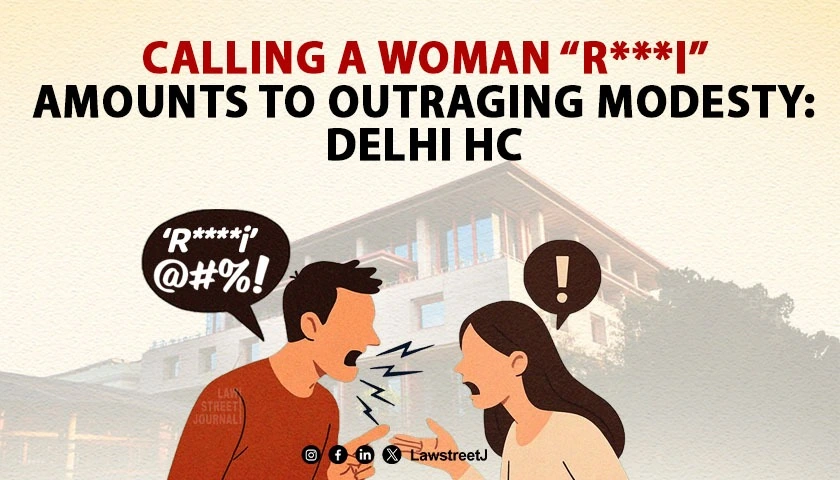New Delhi: The Delhi High Court has delivered a significant judgment ruling that calling a woman “r***i” constitutes an offense under Section 509 of the Indian Penal Code (IPC), while clarifying the distinction between generic abuse and sexually-charged language.
Justice Dr. Swarana Kanta Sharma, while deciding a criminal revision petition challenging the discharge of three accused persons in a case registered under Section 509 IPC, made important observations about what constitutes outraging the modesty of a woman.
The court noted that the petitioner, a Vice-Principal of a school, had alleged that three respondents had subjected her to indecent remarks and abusive language in the Principal’s office on July 5, 2013.
Distinguishing between different types of abusive language, the court held:
“The essential element of Section 509 of IPC is the intention to insult the modesty of a woman, which has been consistently interpreted by the Hon’ble Supreme Court to mean an act or expression that is sexually coloured, or is suggestive of sex, thereby affecting the dignity of a woman as a woman.”
Regarding the specific allegations against two of the accused who had allegedly called the complainant “saali” and made threats about her promotion, the court observed:
“These allegations, even if taken at their face value, would prima facie not attract the ingredients of Section 509 of IPC… They are in the nature of generic abuses which, at best, amount to use of derogatory language, but lack the sexual connotation or suggestive element required to bring them within the ambit of Section 509 of IPC.”
However, with respect to the accused Hari Kishan who had allegedly called the complainant “r***i”, the court took a different view. Justice Sharma stated:
“The use of such an expression cannot be regarded as a mere abuse or a casual insult. The word, when directed towards a woman, is laden with sexual innuendo and directly imputes unchastity to her. It is not a casual term of abuse but one which specifically attacks a woman’s character by questioning her sexual dignity and portraying her as of loose moral character.”
The court further observed:
“Such a term, when used, is bound to humiliate a woman and lower her in the estimation of others by attacking her very status as a woman.”
Accordingly, the court concluded that the allegation against respondent Hari Kishan would prima facie fall within the ambit of Section 509 IPC.
Citing the Supreme Court’s judgment in Madhushree Datta v. State of Karnataka, the court emphasized that “modesty refers to the respect and dignity of a woman majorly owing to her sex, which effectively translates to her sexual dignity and decency.”
The court directed that while respondent Hari Kishan should face trial for the offense under Section 509 IPC, the discharge of the other two respondents was upheld as their alleged conduct did not contain the necessary sexual connotation required for the offense.
In conclusion, while distinguishing between generic abuse and sexually-charged language that attacks a woman’s dignity, the Delhi High Court clarified that words with sexual innuendo that question a woman’s chastity and moral character constitute outraging of modesty under Section 509 of the Indian Penal Code.
APPEARANCES: Mr. Aditya Aggarwal, Advocate along with Ms. Pooja Roy and Ms. Shivani Sharma, Advocates appeared for the Petitioner, whereas Mr. Naresh Kumar Chahar, APP for the State along with Ms. Puja Mann and Mr. Chanderkant, Advocates appeared for the State. Ms. Kajal, Advocate appeared for Respondents 2 to 4.
CASE TITLE: Shashi Bala v. State Govt. of NCT of Delhi & Ors. [CRL.M.C. 1162/2019]



![Delhi High Court Sets Aside Arbitral Tribunal's Award Against NHAI in Highway Project Delay Case [Read Judgment]](/secure/uploads/2023/07/lj_9605_23374c2e-392c-4491-a2fe-f2f12fc5272f.jpg)
![Delhi Court Rejects Stay Request in Defamation Case Against Rajasthan CM Ashok Gehlot [Read Order]](/secure/uploads/2023/08/lj_5208_80de1ddc-d76a-4f7f-b180-408e3ae14fb4.jpg)





